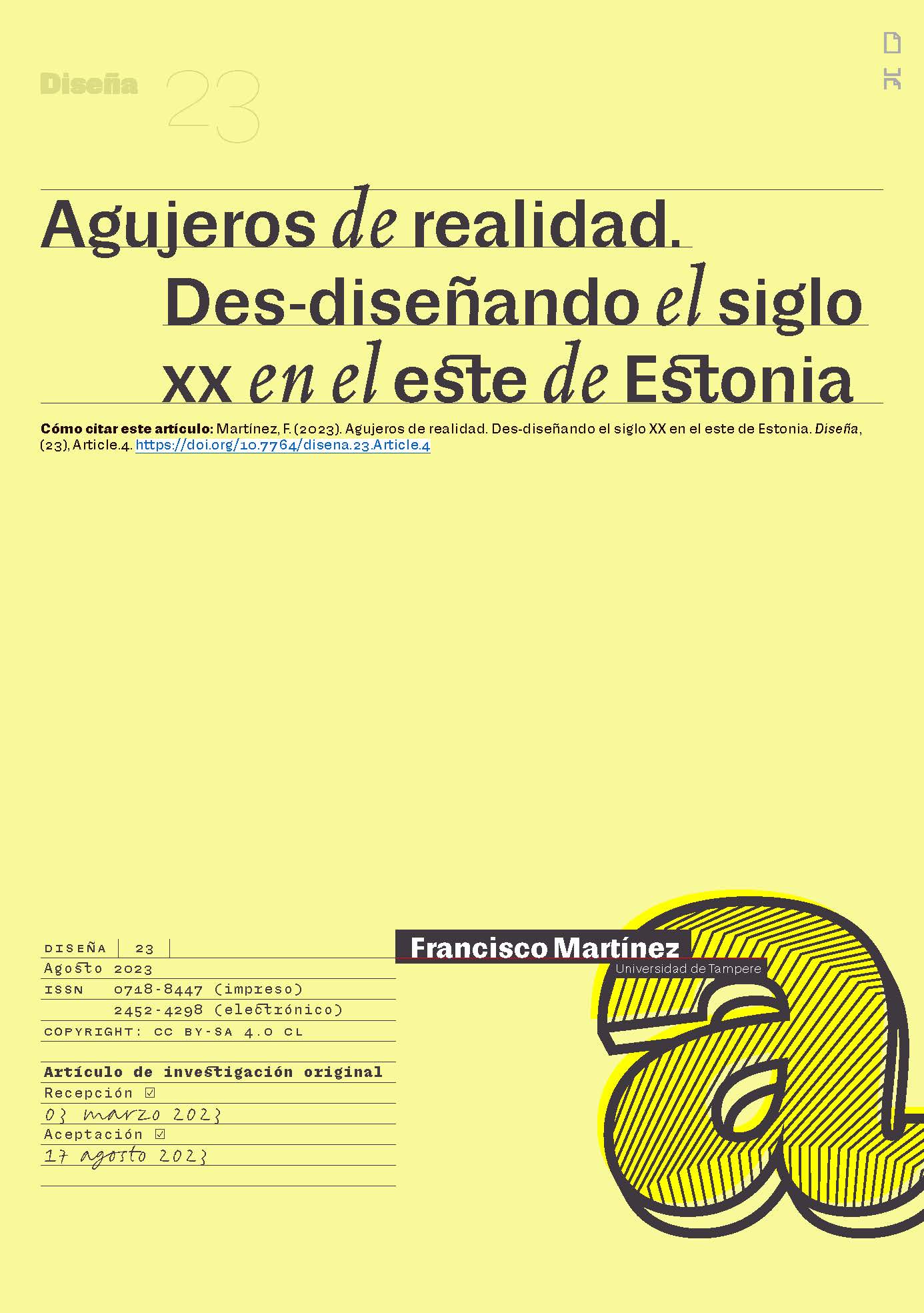Reality Holes. Undesigning the 20th Century in Eastern Estonia
Main Article Content
Abstract
Through the study of mining holes that have appeared in Kohtla-Järve, this article shows how repair work can take on a political charge by re-ordering the social and materializing different dimensions of care. In this regard, the investigation of situated forms of material failure leads us to reconsider who has, or should have, the responsibility to fix what is broken, and how repair is linked to questions of future-making and care. The conclusion points, first, to the fact that repairing entails facing the harmful consequences of past design decisions, long after; second, that, when projecting post-extractivist futures, we must confront the need to undo the pernicious elements of modernity; and third, that critiques about the social and ecological cost of infrastructural failure must include the perspectives of local population.
ARTICLE ONLY AVAILABLE IN SPANISH
Downloads
Article Details

This work is licensed under a Creative Commons Attribution-ShareAlike 4.0 International License.

This work is licensed under a Creative Commons Attribution-ShareAlike 4.0 International license.
COPYRIGHT NOTICE
All contents of this electronic edition are distributed under the Creative Commons license of "Attribution-ShareAlike 4.0 Internacional" (CC-BY-SA). Any total or partial reproduction of the material must mention its origin.
The rights of the published images belong to their authors, who grant to Diseña the license for its use. The management of the permits and the authorization of the publication of the images (or of any material) that contains copyright and its consequent rights of reproduction in this publication is the sole responsibility of the authors of the articles.
References
Bennett, J. (2010). Vibrant Matter: A Political Ecology of Things. Duke University Press.
Callén, B., & Criado, T. S. (2015). Vulnerability Tests. Matters of “Care for Matter” in E-waste Practices. Tecnoscienza: Italian Journal of Science & Technology Studies, 6(2), Article 2.
Carroll, T., Jeevendrampillai, D., Parkhurst, A., & Shackelford, J. (Eds.). (2017). The Material Culture of Failure: When Things Do Wrong. Bloomsbury.
Denis, J., & Pontille, D. (2014). Maintenance Work and the Performativity of Urban Inscriptions: The Case of Paris Subway Signs. Environment and Planning D: Society and Space, 32(3), 404-416. https://doi.org/10.1068/d13007p
Denis, J., & Pontille, D. (2015). Material Ordering and the Care of Things. Science, Technology, & Human Values, 40(3), 338-367. https://doi.org/10.1177/0162243914553129
Dzenovska, D. (2018). Emptiness and its Futures: Staying and Leaving as Tactics of Life in Latvia. Focaal, 2018(80), 16-29. https://doi.org/10.3167/fcl.2018.800102
Dzenovska, D. (2020). Emptiness. Capitalism Without People in the Latvian Countryside. American Ethnologist, 47(1), 10-26. https://doi.org/10.1111/amet.12867
Graham, S., & Thrift, N. (2007). Out of Order: Understanding Repair and Maintenance. Theory, Culture & Society, 24(3), 1-25. https://doi.org/10.1177/0263276407075954
Henke, C. R., & Sims, B. (2020). Repairing Infrastructures: The Maintenance of Materiality and Power. MIT Press.
Jackson, S. J. (2014). Rethinking Repair. In T. Gillespie, P. J. Boczkowski, & K. A. Foot (Eds.), Media Technologies: Essays on Communication, Materiality, and Society (pp. 221-239). MIT Press. https://doi.org/10.7551/mitpress/9042.003.0015
Latour, B. (2005). Reassembling the Social: An Introduction to Actor-Network-Theory. Oxford University Press.
Marres, N. (2012). Material Participation: Technology, the Environment and Everyday Publics. Palgrave Macmillan.
Martínez, F. (2019a). Insiders’ Manual to Breakdown. In F. Martínez & P. Laviolette (Eds.), Repair, Brokenness, Breakthrough: Ethnographic Responses (pp. 1-16). Berghahn.
Martínez, F. (2019b). What Is in a Hole? Voids out of Place and Politics below the State in Georgia. In F. Martínez & P. Laviolette (Eds.), Repair, Brokenness, Breakthrough: Ethnographic Responses (pp. 121-144). Berghahn.
Martínez, F. (2020). Politics of Recuperation: Repair and Recovery in Post-crisis Portugal. Bloomsbury.
Martínez, F. (2023). From Repair to Post-brokenness: Horizontal Materialisations in Estonia and Portugal. Etnográfica (in press).
Martínez, F., & Agu, M. (2021). Postcards from the Edge: Territorial Sacrifice and Care in Eastern Estonia. Roadsides, 5. https://doi.org/10.26034/roadsides-202100510
Martínez, F., & Laviolette, P. (Eds.). (2019). Repair, Brokenness, Breakthrough: Ethnographic Responses. Berghahn.
Mol, A. (2008). The Logic of Care: Health and the Problem of Patient Choice. Routledge.
Tironi, M., & Rodríguez Giralt, I. (2017). Healing, Knowing, Enduring: Care and Politics in Damaged Worlds. The Sociological Review Monographs, 65(2), 89-109. https://doi.org/10.1177/0081176917712874
Tronto, J. (1993). Moral Boundaries: A Political Argument for an Ethic of Care. Routledge.
Ureta, S. (2014). Normalizing Transantiago: On the Challenges (and Limits) of Repairing Infrastructures. Social Studies of Science, 44(3), 368-392. https://doi.org/10.1177/0306312714523855

